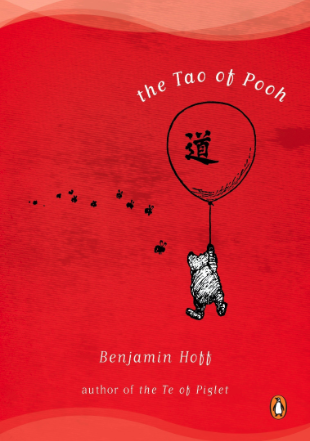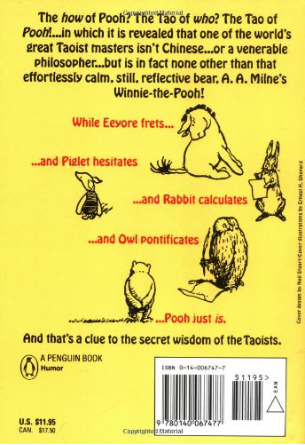Overview
This book came to me at a time when I was running around (seemingly) like crazy for my job in Austin, Texas. I have long been enamored with learning more about Eastern philosophy, and the idea of having it framed by one of my favorite childhood stories was too much to resist. So, today, I’m going to share and discuss five quotes from The Tao of Pooh.
Quote #1
“Life itself, when understood and utilized for what it is, is sweet.”
This quote, for me, brings up two questions: “Do I understand life?” and “Am I utilizing it for what it is?” Life, for me, is an opportunity to experiment, in so far as those experiments don’t do unnecessary and irreparable harm to others. It is also a great blessing to experience the love of others and to give your love to others. Finally, it is a chance to explore your creative passions and leave behind a legacy that inspires future generations to explore theirs as well.
Quote #2
“The wise are not learned; the learned are not wise. “ – Lao Tse, Tao de Ching
This quote is a statement on book knowledge versus knowledge gained from direct experience. There are pros and cons to both. We (the lucky ones) have more access to knowledge than the generations that have come before us, but there will always be a vast amount of knowledge that can only be gained by going out into the world, experimenting and failing, and learning from our experiences.
Quote #3
“A scholar named Wang
Laughed at my poems.
The accents are wrong,
He said,
Too many beats;
The meter is poor,
The wording impulsive.
I laugh at his poems,
As he laughs at mine.
They read like
The words of a blind man
Describing the sun.” -Han-Shan
In building off the previous quote, this poem brings us a real-life example to analyze. The scholar (Wang, in this case) has clearly studied the ins and outs of poetry. He knows how to structure poems, what meter to use for different situations, where to place his accents, how many beats to use, and how to be selective and purposeful with his wording.
But, in the eyes of Han-Shan (who perhaps comes from a less scholarly background), Wang’s studies have not prepared him to write poetry that truly describes the world around him and shares it with others. He lacks the experience to make his words, beat, and meter jump off the page, which may very well be the point of poetry after all.
Quote #4
“Knowledge and Experience do not necessarily speak the same language. But isn’t the knowledge that comes from experience more valuable than the knowledge that doesn’t?”
Indeed, this is the question, isn’t it? From my experience (cough, no pun intended), I was only able to learn how to apply the knowledge I gained in traditional school settings by going out and attempting to apply it. I made mistakes. I upset bosses and co-workers and myself. It took years of experience to learn how to apply that knowledge to real-life settings.
Maybe I would have gained that same knowledge by simply jumping into the ‘experience’ without a preemptive “knowledge-downloading” phase. Maybe I would have saved myself a few years of learning curve and a few thousand dollars. But we learn by both studying and experiencing, and one of the truths that I do know is that there’s no sense in crying over spilled milk. We are always learning and growing. So there’s no sense in worrying about what might’ve been.
Quote #5
“It seems fairly obvious to some of us that a lot of scholars need to go outside and sniff around–walk through the grass, talk to the animals. That sort of thing…“Lots of people talk to animals,” said Pooh. “Maybe, but…” “Not very many listen, though,” he said. “That’s the problem,” he added.”
It seems fairly obvious to me (to plagiarize only slightly) that we all need to get outside and sniff around. We need to run our fingers through the tall grasses, smell the sweet scent of the air, and feel (and maybe even taste) the dirt. We need to commune with the animal species (that belong to the same animal kingdom to which we belong, lest we forget) in our backyards, front yards, bird feeders, and wilderness areas.
But, as Pooh says, we also need to listen. We need to listen when the migrating birds tell us that they can no longer stop in an area they’ve visited for years because it now lacks enough sustenance to make a stop worthwhile. We need to listen when the bears tell us that they’d rather spend their evenings breaking into garages to root through our trash than spending their days foraging for honey and berries.
We need to pay attention to ocean mammals beaching themselves en mass (maybe because they’re sick of all the plastic that’s floating around as they try to nurse their young). There are so many signals that Nature gives us, if we just listen.
Your Turn!
Now it’s your opportunity to read and digest The Tao of Pooh for yourself! While I hope you’ve enjoyed the quotes I pulled from it and highlighted here, this is by no means a complete review. If you’ve read this selection already, I’d love to know your thoughts, feelings, and what you took away from it.
Please leave a comment below if you are inspired, perplexed, saddened, or angered by any of the ideas presented above. I welcome any and all comments and will do my best to respond in a timely fashion.
I’d also encourage you to share this with others if you found it particularly insightful or helpful. Be sure to tag @ballisterwriting on Facebook or Instagram if you do! The point of social media, after all, is to be SOCIAL! I don’t need followers or likes, but I’d like to contribute to a real conversation about how we continue to improve as a society and as individuals.
Happy Reading!
Tucker Ballister



Hi Tucker!
I especially liked quote #4. Experience and knowledge definitely do not share the same language. This is experienced in a lot of work places. Someone who went to school would come into the work place, feeling like they know better than the people who have been in the field for years. Then there are the people who have been in the field for years who scoff at the scholars due to their inexperience. If they work together and teach one another, things would actually progress!
Thank you for these quotes! They really are a reminder and eye opener.
Mandy
Imagine a world in which a diversity of experience and schooling was valued, shared, and embraced in order to make everyone’s lives better!!
I like Quote #2, “The wise are not learned; the learned are not wise. “ I think this is a very valuable lesson that everyone should know. I’m a baking teacher. I always tell my students that wisdom comes from experience more than knowledge learned in textbooks. I want them to try and experiment with their cakes so that their experience will grow more and build a strong foundation out of the mistakes they went through. This is all I can share. Nice quotes and I also love Winnie the Pooh stories.
I love the first quote Quote #1 which talks about life. Indeed life can never be sweet if one does not find out or know the very purpose. It is true that when the purpose of a thing is not known, abuse is inevitable; that’s same with a destiny not discovered.
If only we can know the purpose why each and everyone of us are created, we’d live a fulfilled and purpose driven life.
Nice book and thanks for sharing.
Thanks for sharing. I love that connection to ‘a destiny not discovered.’ Great food for further thought!
Yeah. 🙂
Hi, Tucker, excellent article giving potential readers a taste of what to expect in this book. As a fan of philosophy myself, I always have to take a look into these excellent quotes and the second one really jumped out at me, regarding book and experience knowledge.
I agree that we are very lucky to be born in an age where we have easy access to both. For someone who’s a kinesthetic learner in nature, I definitely see the pros and cons with book knowledge. Anything I read or learn about that isn’t experienced based, I always need to do something the book states to gain experience, even if it’s simply writing about what I learned.
Thanks for such an excellent article and a nice snapshot at what to expect in this product review.
I had to read this post just based on the title alone. I was never a Pooh follower, but I have seen a few of the animations and what not.
The idea of taking eastern philosophy and encasing it in a western children’s book is intriguing to me. Some quotes you referenced really get you thinking, especially when it’s interactive dialogue with the reader and Pooh as in Quote #5. It’s not really interactive as in you’re the one talking to Pooh but the wording give it that feel.
I really hope this type of integration reaches many people. I think it’s a fine way to introduce philosophies and even other topics in a safe and friendly manner.
Thanks for the read!
I’m glad you enjoyed it! I highly recommend reading the whole book if, and when, you have the time. There’s a lot more to it than just what I highlighted here.
This book is profoundly interesting. I love the quotes that you shared. To really grasp the knowledge of life, I believe being mindful and cultivating the ability to sense our surrounding are both important things that we often neglected. I believe this book definitely can mould us to have more balance in life.